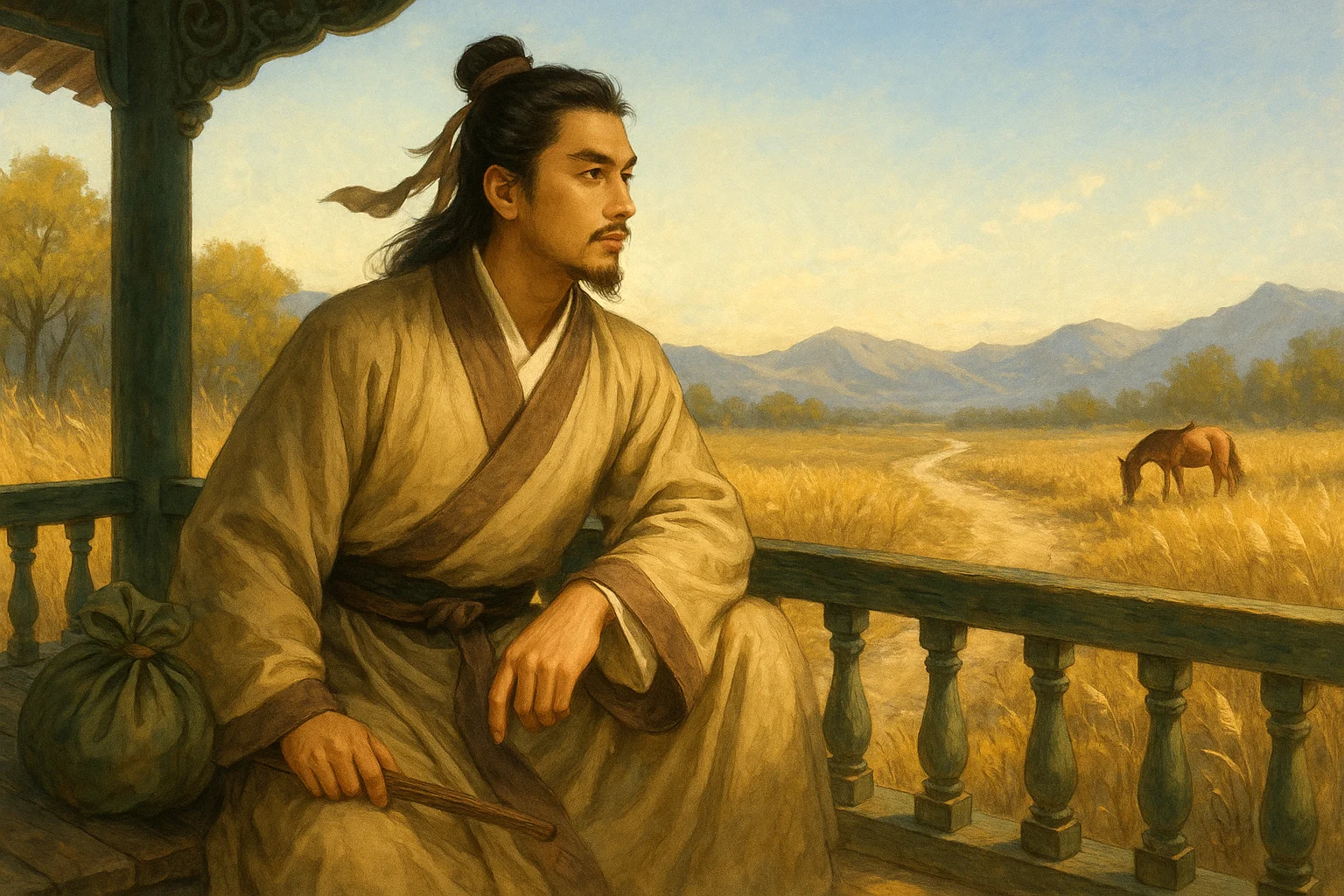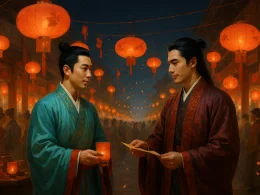Born of waves, now on stone you rise,
Red blooms braving autumn skies.
Who notices the last flower’s grace,
When all others leave no trace?
Original Poem
「石莲花」
司空曙
今逢石上生,本自波中有。
红艳秋风里,谁怜众芳后。
Interpretation
Though its exact date of composition remains unrecorded, this poem likely stems from Sikong Shu's period of mountain reclusion or deep communion with nature. As a leading voice among the "Ten Literary Masters of the Dali Era," Shu perfected a style of quiet luminosity—where natural observation becomes metaphysical meditation. Here, a stone lotus (石莲), thriving improbably between rock and water, mirrors the poet's own existential stance between worldly engagement and spiritual detachment.
First Couplet: "今逢石上生,本自波中有。"
Jīn féng shí shàng shēng, běn zì bō zhōng yǒu.
Now we meet it growing on stone— / Though its true home was always water.
The opening juxtaposes apparent habitat ("stone") with essential origin ("water"), suggesting life's capacity to adapt without losing its fundamental nature. This duality resonates with Tang scholar-officials' own navigation between bureaucratic service ("stone" as institutional rigidity) and personal integrity ("water" as inner fluidity).
Second Couplet: "红艳秋风里,谁怜众芳后。"
Hóng yàn qiūfēng lǐ, shuí lián zhòng fāng hòu.
Its crimson blaze in autumn winds— / Who notices beauty that outlasts the floral chorus?
A meditation on belated recognition: while common flowers monopolize spring's attention, the stone lotus achieves brilliance when others have faded. "Autumn winds" (秋风) symbolize both literal seasonal adversity and political coldness, making the lotus a stand-in for unrecognized virtue. The rhetorical "who notices" (谁怜) channels the poet's own experience of late-career marginalization.
Holistic Appreciation
Though merely twenty characters long, this poem carries profound meaning, embedding philosophical reflections within its depiction of an object. The stone lotus embodies both delicate beauty and resilient strength: rooted in rock yet born of water, blooming in autumn winds yet overlooked amidst other flowers. Through this imagery, the poet expresses his own sense of lofty solitude and quiet detachment. The juxtaposition of "from waves it comes" and "on stone it grows" creates a paradoxically unified image, hinting at how superficial perceptions often obscure deeper truths. Though its "crimson brilliance" dazzles, blooming late in the season renders it unappreciated—perhaps mirroring the poet’s own experience of unrecognized talent and untimely opportunities. Concise yet resonant, the poem uses floral symbolism to meditate on life’s complexities, exemplifying the beauty of understated philosophical poetry.
Artistic Merits
- Philosophy Through Object, Aspiration Through Symbol: The stone lotus’s unique habitat and late bloom channel the poet’s emotions and life insights, transcending mere description.
- Contrastive Imagery, Layered Emotion: Pairing "crimson brilliance" with "autumn winds," "stone" with "waves," and "last among flowers" with "unloved" creates poignant tension, intensifying the poem’s subdued ache.
- Precise Diction, Far-reaching Meaning: With minimal words, the poem achieves rich philosophical depth, showcasing Sikong Shu’s concise yet profound style where meaning outweighs verbiage.
Insights
This poem enlightens us: True worth lies not in prominence or timely recognition but in intrinsic nobility and resilience. Like the stone lotus, one should bloom steadfastly on rocky terrain, persist through autumn gales, and trust that inner beauty will eventually find its audience. It is a poetic allegory for staying true to oneself and awaiting fulfillment with patience.
About the poet

Sikong Shu (司空曙), c. 720 – c. 790, courtesy name Wenming, was a native of Guangping (present-day Yongnian County, Hebei Province). A renowned mid-Tang dynasty poet, he was one of the "Ten Literary Masters of the Dali Era," alongside Lu Lun, Qian Qi, Han Hong, Li Duan, and others. Though his life lacked illustrious achievements, his poetry—marked by genuine emotion in simplicity and profound contemplation in solitude—secured him a unique place in mid-Tang literary circles.












